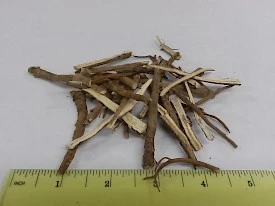Understanding How Chai Hu Shu Gan Wan Help With Depression in Epilepsy Patients (Study)
Chinese Medicine offers a number of options to help alleviate depression. There are studies and clinical evidence showing both acupuncture and Chinese herbal medicine are often helpful when used appropriately. From a Chinese Medicine perspective there are many underlying diagnoses (i.e. sets of causes and conditions) that can lead to depressive symptoms. Many of those are outlined in our depression treatment section.
One Chinese herbal formula which is commonly used to treat depression is Chai Hu Shu Gan Wan. This formula is particularly useful when the underlying diagnosis is liver qi stagnation with spleen qi deficiency, as well as some other related diagnoses. Along with depression, this formula may be appropriate in some cases of epilepsy, certain menstrual irregularities, certain types of headaches or migraines and more.
The formula is generally comprised of the following herbs:
 Thorowax Root, Chai Hu, which may be used for symptoms of liver qi stagnation such as vertigo, menstrual issues, upper right quadrant pain, depression, irritability as well as certain digestive issues, organ prolapses, hemorrhoids, loose stools.
Thorowax Root, Chai Hu, which may be used for symptoms of liver qi stagnation such as vertigo, menstrual issues, upper right quadrant pain, depression, irritability as well as certain digestive issues, organ prolapses, hemorrhoids, loose stools.- Tangerine Peel, Chen Pi, which may is an important herb to dry dampness in the body which can be the phlegm we think of in the sense of mucus, but it is a deeper concept in Chinese Medicine which can lead to unclear thinking and/or a range of digestive issues such as bloating, nausea, belching, directs energy downwards.
- Szechuan Lovage Root, Chuan Xiong, is commonly in formulas that help with headaches due to the fact that it acts as an invigorator of the blood which also helps with a range of menstrual issues including painful cycles, difficult labor, etc.
- Nut Grass Rhizome, Xiang Fu, is used another herb which helps move blood stagnation and aid the spleen system (i.e. digestive functions), useful with hypochondriac and/or epigastric pain.
- Honey Fried Licorice Root, Zhi Gan Cao, important herb for strengthen the digestive functions, ultimately the qi and the blood, the fried version tonifies more strongly.
While the formula is established for treating depression, researchers from Hunan University in China conducted the study I'm exploring today to look specifically at the effect of the formula on depression in patients with epilepsy. Using an epilepsy and depression induced rat model along with a fluoxetine (Prozac, Sarafem, Rapiflux, Selfemra) control group.
The rats were treated every day for 28 days and then bio-chemical analysis was done. For the changes they were looking at in this model, the researchers found no statistical difference between the fluoxetine group and the Chai Hu Shu Gan Wan treatment groups. They looked at the following measures:
- mRNA levels of the 5-HT1A receptor - a subtype of the 5-HT receptor which binds serotonin, so when these levels are increased depressive symptoms are lessened.
- Number of BrdU-labeled cells in the hippocampal dentate gyrus - increases in BrdU labeled cells signify increased proliferation of cells in an area - in this case the dentate gyrus. The dentate gyrus is part of the hippocampus and is related to our experience of stress and depression, the formation of new memories and the exploration of new environments.
They concluded that Chai Hu Shu Gan Wan "effectively improves certain symptoms of depression" in a epilepsy/depression model.
This type of study which uses chemical analysis to better understand the internal biochemical effects of Chinese herbal formulas are very useful. For practitioners, we are largely long past the need to show the positive clinical effect of these formulas when properly used. But better understanding of how they work only increases our understanding. Further, direct comparison with popular western drugs, in this case fluoxetine, are also important. While the study doesn't get into human use details, there are generally far less side effects (generally none) with Chinese herbal medicine when properly used. Obtaining similar effects to western drugs without side effects and at a much lower cost is important for patients to increase their understanding of available treatment options.
You may also be interested in similar article looking at acupuncture and the treatment of depression in comparison with prozac.
tag @yinyanghouse for questions/comments